History
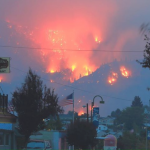 This year has been unique in a horrible sort of way. We are used to California having fires every year when the Santa Ana Winds kick in, bringing scorching heat that dries out the vegetation, making it vulnerable to the smallest spark. Once the fire starts, they are difficult to contain because of the same winds that started the problem in the first place. We hear of these fires every year…sadly it can seem almost routine…even though it shouldn’t. This year is different, however. This year the whole western coast seems to be on fire. The Redwoods are in danger. Washington, Idaho, and Oregon are also going up in smoke.
This year has been unique in a horrible sort of way. We are used to California having fires every year when the Santa Ana Winds kick in, bringing scorching heat that dries out the vegetation, making it vulnerable to the smallest spark. Once the fire starts, they are difficult to contain because of the same winds that started the problem in the first place. We hear of these fires every year…sadly it can seem almost routine…even though it shouldn’t. This year is different, however. This year the whole western coast seems to be on fire. The Redwoods are in danger. Washington, Idaho, and Oregon are also going up in smoke.
The Pacific Northwest has always been the rainforest of the United States, receiving rain approximately 155 days a year. Since Wyoming gets snow much more often than rain, and in recent years, we haven’t received as much of that as we used to, suffice it to say that we don’t even come close to the amount of rain the Pacific Northwest normally gets. This year however, has found the Pacific Northwest oddly void of rainfall. Wyoming, by a stark contrast, has had a very rainy summer. As someone who doesn’t like days 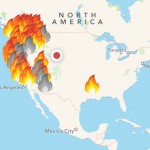 and days of dreary rainfall, that has been a little much for me, but then when I look at the west with its fires, and the rest of the United States largely void of fires, I have to be thankful for the rain. It seems that the only place that is getting very little rain is the west coast.
and days of dreary rainfall, that has been a little much for me, but then when I look at the west with its fires, and the rest of the United States largely void of fires, I have to be thankful for the rain. It seems that the only place that is getting very little rain is the west coast.
I have looked at fire maps many times over the years, but I don’t ever recall the maps having such a lopsided look to them. Nevertheless, that is the look of the current fire map. There is only one significant fire that is not in the west. Our skies are filled with smoke that has rolled in from the west. The mountain is pale behind a curtain of smoky haze, and everything smells burnt…and I’m not even near a fire. I cannot begin to imagine how bad the smoke and the smells are in the thick of the fires. Town after town is being evacuated. Homes, hopes, and dreams are being lost…not to mention lives. It just tears at my heart to think of the devastation to some of the most beautiful rainforest areas of our nation. Places like the Redwoods really could be gone forever, and I can’t begin to imagine how long it will take to bring back the beautiful, moss and fern filled areas of the  rainforest.
rainforest.
With family and friends all along the west coast, I have been in constant prayer for protection for them, and especially for rain with no lightning. There are some years when fires are so bad, that people can’t wait for summer to end, hoping that the cooler weather will slow down the devastation. I have a feeling that the only thing that will do that will be winter snow or rain, so for their sake, I will agree with their prayers. We have had bad fire years here too, but it never seemed to get quite as bad as it has on the west coast this year. Fires anywhere are awful, but when they are in an area known for it rain, it is simply shocking.

 Lots of people have been to a professional baseball games these days, but in years gone by, if you didn’t live in a city that had a professional baseball team, you just didn’t have much opportunity to attend a professional baseball game. I’m sure that attendance was never stellar, and maybe that was the reason for broadcasting the games originally by radio, and later by television, and then finally on our computers and phones. Lots of people can’t get to the games, and even if they can sometimes, it isn’t often. Since most of us have watched the games on television, we can attest to the importance, to an avid fan, of having a television broadcast.
Lots of people have been to a professional baseball games these days, but in years gone by, if you didn’t live in a city that had a professional baseball team, you just didn’t have much opportunity to attend a professional baseball game. I’m sure that attendance was never stellar, and maybe that was the reason for broadcasting the games originally by radio, and later by television, and then finally on our computers and phones. Lots of people can’t get to the games, and even if they can sometimes, it isn’t often. Since most of us have watched the games on television, we can attest to the importance, to an avid fan, of having a television broadcast.
Up until August 26, 1939, the radio or physical attendance was all we had. All that changed on this day in  1939, when the first televised Major League Baseball game, which was a doubleheader between the Cincinnati Reds and The Brooklyn Dodgers was covered on television from Ebbets Field in Brooklyn, New York. What an exciting day that was!! People everywhere, who were previously unable to watch a professional base ball game, got to see it on television. I think this had an explosive affect on the fan base for professional sports. People could finally pick a favorite team and actually see them play sometimes, because let’s face it, not all of us live in a town that hosts a professional team in any sport. And yes there are a lot of fans that love sports of any kind, but can’t get to a game.
1939, when the first televised Major League Baseball game, which was a doubleheader between the Cincinnati Reds and The Brooklyn Dodgers was covered on television from Ebbets Field in Brooklyn, New York. What an exciting day that was!! People everywhere, who were previously unable to watch a professional base ball game, got to see it on television. I think this had an explosive affect on the fan base for professional sports. People could finally pick a favorite team and actually see them play sometimes, because let’s face it, not all of us live in a town that hosts a professional team in any sport. And yes there are a lot of fans that love sports of any kind, but can’t get to a game.
Of course, as anyone who has ever attended a game in person will tell you, the televised version of the game leaves a lot out of the actual view of the game. They do the best they can, and they do a very good job, but being able to see the instant replay helps clarify the actions of the game immensely too. And when you think about it, half the fun of being there is ball game food. That adds to the whole experience, and while you 
 may be able to make ballpark franks at home, they just don’t taste quite the same as they do when you are at the game. Maybe it’s about all the food smells in general. So while televised games have definitely not taken away from the number of people in attendance at the games, it has expanded the fan base to include those who can’t be at the game in person. August 26, 1939 was a big day in Major League Baseball. It meant much more than just being able to see the game on television…it brought baseball into our homes in a very real way, and that was amazing.
may be able to make ballpark franks at home, they just don’t taste quite the same as they do when you are at the game. Maybe it’s about all the food smells in general. So while televised games have definitely not taken away from the number of people in attendance at the games, it has expanded the fan base to include those who can’t be at the game in person. August 26, 1939 was a big day in Major League Baseball. It meant much more than just being able to see the game on television…it brought baseball into our homes in a very real way, and that was amazing.
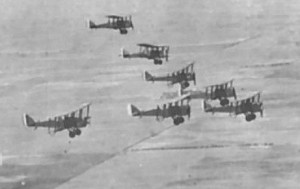
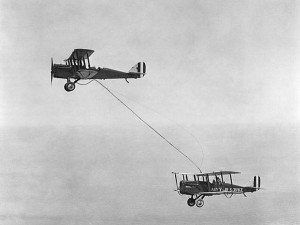 The terrorist attacks that took place at the World Trade Center in New York, the Pentagon in Washington DC, and just outside Shanksville, Pennsylvania on September 11, 2001 brought about changes in our country that we never thought we would see. For the first time in modern aviation history, all air traffic, except for military security planes were grounded. The skies were eerily void of contrails from planes, and the air lacked the sounds from them that we had become so used to that we almost didn’t notice the sounds anymore…unless, like me, you just like planes, and like to watch them.
The terrorist attacks that took place at the World Trade Center in New York, the Pentagon in Washington DC, and just outside Shanksville, Pennsylvania on September 11, 2001 brought about changes in our country that we never thought we would see. For the first time in modern aviation history, all air traffic, except for military security planes were grounded. The skies were eerily void of contrails from planes, and the air lacked the sounds from them that we had become so used to that we almost didn’t notice the sounds anymore…unless, like me, you just like planes, and like to watch them.
Of course, eventually we would begin to see planes again, because we are a nation on the move and planes are essential. The planes began flying again, but with them came a lot more military planes. In most ways that was good, but with that came something else that I never expected to see…mid-air refueling. I have only seen this in action one time. I was on my way into my sister’s house and I looked up because I heard a plane. It was actually two planes…very close together. With 9-11 so fresh in my mind, my first thought was that I might be witnessing an attack above my head. I stood there and watched closely. The planes weren’t so high that you couldn’t see the refueling line as it connected one plane to the other. I was fascinated…and relieved…to witness that. I don’t know how many people have seen it, but my guess is that it isn’t many…at least outside of the aviation industry or the military. Of course, the planes were moving and I didn’t see the line being retracted, but I still felt rather privileged to see that technology in action.
Mid-air refueling is not something that is so new, in fact the first time a plane was refueled in mid-air was on this day, August 23,1923. The Airco DH.4 was a British two-seat biplane day bomber of World War I. It was designed by Geoffrey de Havilland for Airco, and was the first British two-seat light day-bomber to have an effective defensive armament. It first flew in August 1916 and entered service with the Royal Flying Corps in March 1917. The majority of DH.4s were actually built as general purpose two-seaters in the United States, for service with the American forces in France. The plane could do just about anything needed…except fly for an extended time period. Hence the name day-bomber. Then, all that changed when Captain Lowell Smith and Lieutenant John Richter received the first mid-air refueling on June 27, 1923, from a plane flown by 1st Lieutenant Virgil Hine and 1st Lieutenant Frank Seifert.
When we think of mid-air refueling, we picture something high tech, like what I saw, but the technology for it 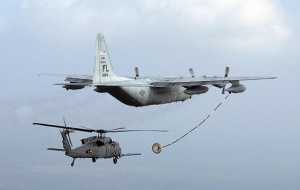
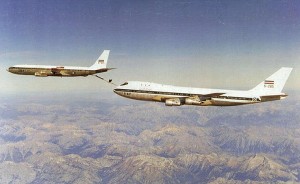 began in the 1920s. To me that seems incredible, but I guess that most inventions take time to develop. Time and hard work, but once they are developed, they can change the course of history. These days, planes are refueled like the two planes I saw and even a plane that refuels a helicopter, which I find completely amazing. The human mind has come up with so many inventions, and I think this one is among the greatest.
began in the 1920s. To me that seems incredible, but I guess that most inventions take time to develop. Time and hard work, but once they are developed, they can change the course of history. These days, planes are refueled like the two planes I saw and even a plane that refuels a helicopter, which I find completely amazing. The human mind has come up with so many inventions, and I think this one is among the greatest.
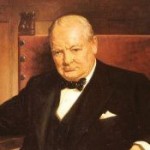 Over the thousands of years since man has been on the Earth, amazing people, as well as evil people, have made memorable speeches. Some speeches were never expected to be memorable or historic, and others were expected to be so, because they were designed to be uplifting, inspirational, morale building, or a tribute filled with gratitude. It was the latter that inspired Sir Winston Spencer Churchill to make his speech on August 20, 1940. Europe was entrenched in World War II and things weren’t going as well as they had hoped. They had taken a few rather large beatings from the Germans, and morale was not as high as they had hoped. The speech was given as the United Kingdom prepared for the expected German invasion. After a series of defeats for the Allies over the prior months, Churchill was trying to tell the people that they were in a much better position now. He was correct, of course. Shortly after the speech, the British won the battle, the first significant defeat for the previously unstoppable Wehrmacht.
Over the thousands of years since man has been on the Earth, amazing people, as well as evil people, have made memorable speeches. Some speeches were never expected to be memorable or historic, and others were expected to be so, because they were designed to be uplifting, inspirational, morale building, or a tribute filled with gratitude. It was the latter that inspired Sir Winston Spencer Churchill to make his speech on August 20, 1940. Europe was entrenched in World War II and things weren’t going as well as they had hoped. They had taken a few rather large beatings from the Germans, and morale was not as high as they had hoped. The speech was given as the United Kingdom prepared for the expected German invasion. After a series of defeats for the Allies over the prior months, Churchill was trying to tell the people that they were in a much better position now. He was correct, of course. Shortly after the speech, the British won the battle, the first significant defeat for the previously unstoppable Wehrmacht.
Times of war are often when great men make speeches to inspire the military troops to persevere. They can be a battle cry of sorts. Or they can be a reflection of such deep gratitude that it leaves us awestruck. Churchill was first moved to utter those famous words upon his exit from the Battle of Britain Bunker at RAF Uxbridge on August 16, 1940. He had been the Number 11 Group RAF Operations Room during a day of battle. Afterwards, Churchill told Major General Hastings Ismay, “Don’t speak to me, I have never been so moved.” His emotions were so deep, that he had to think about this for a time. The two were silent for a few moments, and then Churchill said, “Never in the field of human conflict has so much been owed by so many to so few.” That declaration became the basis of his speech to the House of Commons on August 20, 1940.
In his speech, Winston Churchill said, “The gratitude of every home in our Island, in our Empire, and indeed throughout the world, except in the abodes of the guilty, goes out to the British airmen who, undaunted by odds, unwearied in their constant challenge and mortal danger, are turning the tide of the World War by their prowess and by their devotion. Never in the field of human conflict was so much owed by so many to so few. All hearts go out to the fighter pilots, whose brilliant actions we see with our own eyes day after day, but we must never forget that all the time, night after night, month after month, our bomber squadrons travel far into Germany, find their targets in the darkness by the highest navigational skill, aim their attacks, often under the heaviest fire, often with serious loss, with deliberate, careful discrimination, and inflict shattering 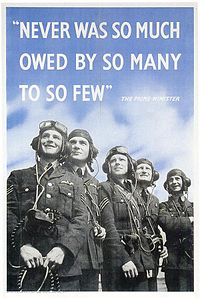 blows upon the whole of the technical and war-making structure of the Nazi power. On no part of the Royal Air Force does the weight of the war fall more heavily than on the daylight bombers who will play an invaluable part in the case of invasion and whose unflinching zeal it has been necessary in the meanwhile on numerous occasions to restrain…”
blows upon the whole of the technical and war-making structure of the Nazi power. On no part of the Royal Air Force does the weight of the war fall more heavily than on the daylight bombers who will play an invaluable part in the case of invasion and whose unflinching zeal it has been necessary in the meanwhile on numerous occasions to restrain…”
Words can be so powerful. They have the power to change the course of history when they are used to inspire soldiers in battle to a victory that seemed impossible just moments before the words were spoken. Sometimes, all it takes to bring about a victory is to listen to the one person who sees that victory, no matter how many defeats have preceded it, is still possible. Great men…men who have inspired victory…have been around a long time. These men, and women too, refuse to accept defeat. And they have the ability to speak powerfully to convince others that victory can follow defeat.
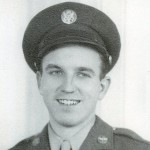 In 1990, when the remake of the movie, Memphis Belle came out, I watched it with intrigue, knowing that my Dad, Allen Spencer had been a top turret gunner and flight engineer on a B-17G Bomber in the 8th Air Force stationed in Great Ashfield, Suffolk, England. The Memphis Belle, a Boeing-built B-17F-10-BO, USAAC Serial No. 41-24485, was added to the USAAF inventory on July 15, 1942, and delivered in September 1942 to the 91st Bombardment Group at Dow Field, Bangor, Maine. She deployed to Prestwick, Scotland, on September 30, 1942, moving to a temporary base at RAF Kimbolton on October 1, 1942, and then finally to her permanent base at Bassingbourn, England, on October 14, 1942. Each side of the fuselage bore the unit identification markings of the 324th Bomb Squadron (Heavy). My dad was a part of the 385th Bomb Squadron (Heavy). Dad didn’t arrive in England until early April of 1944. His letter from April 14, 1944 tells his family that he had arrived and couldn’t tell them where he was for security reasons, except to say that he was somewhere in England.
In 1990, when the remake of the movie, Memphis Belle came out, I watched it with intrigue, knowing that my Dad, Allen Spencer had been a top turret gunner and flight engineer on a B-17G Bomber in the 8th Air Force stationed in Great Ashfield, Suffolk, England. The Memphis Belle, a Boeing-built B-17F-10-BO, USAAC Serial No. 41-24485, was added to the USAAF inventory on July 15, 1942, and delivered in September 1942 to the 91st Bombardment Group at Dow Field, Bangor, Maine. She deployed to Prestwick, Scotland, on September 30, 1942, moving to a temporary base at RAF Kimbolton on October 1, 1942, and then finally to her permanent base at Bassingbourn, England, on October 14, 1942. Each side of the fuselage bore the unit identification markings of the 324th Bomb Squadron (Heavy). My dad was a part of the 385th Bomb Squadron (Heavy). Dad didn’t arrive in England until early April of 1944. His letter from April 14, 1944 tells his family that he had arrived and couldn’t tell them where he was for security reasons, except to say that he was somewhere in England.
At the time I watched the remake of the original 1943 documentary film put out by the War Department, I assumed that while the movie said it was based on a true story, there was probably a lot of Hollywood hype to 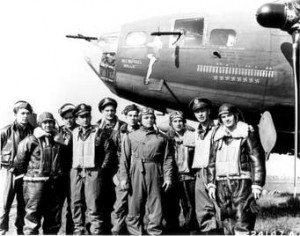 the movie. So, when I read my dad’s letter to his mother, my grandmother, Anna Schumacher Spencer, I was surprised that my dad mentioned it and said she should go see it. From my experience with the movie, I don’t think it would be a film I’d want to watch while my child was still on active duty and fighting from one of those planes. Both the original version and the remake were real enough to either show or tell of events involving the B-17 Bombers in combat situations, and the inevitable shooting down of the planes by the enemy.
the movie. So, when I read my dad’s letter to his mother, my grandmother, Anna Schumacher Spencer, I was surprised that my dad mentioned it and said she should go see it. From my experience with the movie, I don’t think it would be a film I’d want to watch while my child was still on active duty and fighting from one of those planes. Both the original version and the remake were real enough to either show or tell of events involving the B-17 Bombers in combat situations, and the inevitable shooting down of the planes by the enemy.
Of course, the point was to let people know that The Memphis Belle, a B-17 Bomber had become the first plane to accomplish 25 missions without being shot down. It was designed to be a celebration of that accomplishment. And so it was, but it also proved the stark reality that many other B-17 Bombers had been shot down, and in all reality would continue to be shot down. While the accomplishment of The Memphis Belle is nothing to take lightly, I think it would still be hard to think about all those men lost or imprisoned during that war…especially if I was the mother of an airman. In some ways, it surprised me that my dad would even ask his mom to so see the movie. He was always so protective of her. I suppose that in time, you get used to the events of war, especially when you are in the thick of it day after day, and maybe he thought it would give her hope too.

Nevertheless, it seemed rather strange to me that Dad had talked of this movie with his mother. I know that the Memphis Belle was a star, just because they had made it through without being shot down. They were the first, and to those at home trying to support the war effort, that was a moral booster. That made it important to do the movie and to have the Memphis Belle and her crew do tours back in the states. People needed to see the success of the air war. They needed hope that their loved ones would return. I suppose that was what my dad was thinking when he told his mother that she should go see the movie. I don’t know for sure if she did or didn’t, but in the end my dad came home, and that is all that mattered to my grandmother and to me.
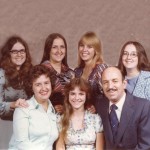 The other day, as my husband, Bob Schulenberg and I were out for a walk, I noticed that the crickets were chirping all around us. Now, I’m not a cricket fan, because they are, after all…a bug, but hearing them was not an unusual event in the summertime. On that particular evening, I guess I just noticed them more than usual. It was a beautiful summer evening, that was cooler that the really hot days we had been having, and with the crickets, it took me back to the summers of my youth. It didn’t matter if we were in the back yard or on a camping trip, the crickets chirping was just a classic summer sound. Then, when you add the birds and sometimes even frogs…well, it’s like going back in time to my childhood.
The other day, as my husband, Bob Schulenberg and I were out for a walk, I noticed that the crickets were chirping all around us. Now, I’m not a cricket fan, because they are, after all…a bug, but hearing them was not an unusual event in the summertime. On that particular evening, I guess I just noticed them more than usual. It was a beautiful summer evening, that was cooler that the really hot days we had been having, and with the crickets, it took me back to the summers of my youth. It didn’t matter if we were in the back yard or on a camping trip, the crickets chirping was just a classic summer sound. Then, when you add the birds and sometimes even frogs…well, it’s like going back in time to my childhood.
Summers in my youth were always carefree days with relatively few chores. We used to lay out in the back yard sunning ourselves, walk to the pool to swim in the afternoon, and then play games with our friends until it got dark, and sometimes even later. The sound of kids yelling, laughing, and talking seemed to be everywhere…like we were trying to live a year’s worth of life in three short months, because then school started again, and there was homework to be done at night. It left a lot less free time. Then, before we knew it,  we were grown up, and our lives took on work and family obligations I wouldn’t trade my life now for those days, because lets face it. I love my life, but those memories are sweet, nevertheless.
we were grown up, and our lives took on work and family obligations I wouldn’t trade my life now for those days, because lets face it. I love my life, but those memories are sweet, nevertheless.
I lived such a wonderful childhood. My family has always been very close. Our parents gave my sisters, Cheryl Masterson, Caryl Reed, Alena Stevens, Allyn Hadlock, and me so many great memories over the years, whether in travel or just at home. I can’t fully explain just how blessed we were. We had all the same obligations as kids, that most kids have. We weren’t spoiled children of privilege, we were just blessed…and I’ll take blessed over privilege any day. We took evening drives sometimes just to look at the lights of the city from lookout point or Event Center Hill…although the Event Center wasn’t there then. My sisters and I called the city lights, spread across the valley where Casper is nestled, the Jewelry Box. I have seen them so many times that I can picture them exactly in my head to this day. Those were such glorious, carefree days, of crickets and evening drives, and sometimes I miss them. We didn’t realize then how blessed we were. We just thought all kids 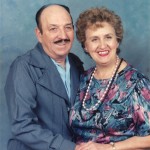 had that kind of life. We later found out just how wrong we were. If I mention some of the things we did as kids, people seem surprised…like it was unheard of. Maybe it was, but my parents just showed us the things they liked to do, like going for evening drives.
had that kind of life. We later found out just how wrong we were. If I mention some of the things we did as kids, people seem surprised…like it was unheard of. Maybe it was, but my parents just showed us the things they liked to do, like going for evening drives.
Those days are long gone now. They live only in my memory files, to be brought out when something like the chirping of a cricket, the smell of a campfire, or a drive down the mountain cause them to come to the forefront once again. The memories are a little bittersweet these days, because both of my parents are in Heaven, but they still remind me of what a blessed childhood I was given, and they make me thankful for the wonderful parents God gave to me and my sisters.

 On August 13, 1961, in the hours just after midnight, the East German soldiers began laying down barbed wire and bricks as a barrier between Soviet-controlled East Berlin and the democratic western section of the city. It was a day that would change life in Berlin for the next twenty eight years. In the days that followed, a wall was built to permanently close off access to the west. The citizens of East Berlin became prisoners in their own homes and city, in a prison that was built around them. The road between East and West Berlin had become a one way street. If you wanted in, you couldn’t come back out. Families were separated from each other, and those in the West had to make the choice to go be with family in East Berlin…and captivity, or not. The wall became the symbol of the Cold War. It was a literal Iron Curtain, dividing Europe.
On August 13, 1961, in the hours just after midnight, the East German soldiers began laying down barbed wire and bricks as a barrier between Soviet-controlled East Berlin and the democratic western section of the city. It was a day that would change life in Berlin for the next twenty eight years. In the days that followed, a wall was built to permanently close off access to the west. The citizens of East Berlin became prisoners in their own homes and city, in a prison that was built around them. The road between East and West Berlin had become a one way street. If you wanted in, you couldn’t come back out. Families were separated from each other, and those in the West had to make the choice to go be with family in East Berlin…and captivity, or not. The wall became the symbol of the Cold War. It was a literal Iron Curtain, dividing Europe.
When World War II ended in 1945, Germany was divided into four Allied occupation zones. Berlin, the German capital, was likewise divided into occupation sectors, even though it was located deep within the Soviet occupation zone. The future of Germany was a source of contention. Disagreements brought tensions which grew when the United States, Britain, and France moved in 1948 to unite their occupation zones into a single autonomous entity known as the Federal Republic of Germany or West Germany. In response, the Soviet Union launched a land blockage of West Berlin in an effort to force the West to abandon the city. The United States and Britain responded with a massive airlift of food and supplies to West Berlin, and in May of 1949, the Soviet Union ended the blockade in defeat.
That didn’t remove the tensions that plagued the area, however. By 1961 the Cold War tensions were running high again. The East German people became very dissatisfied with life under the communist system. West Berlin was a gateway to the West and Democracy. Between 1949 and 1961, about 2.5 million East Germans fled East Berlin to West Germany. By August of 1961, East Germans were crossing into West Germany at a rate of 2,000 people per day. Many of the refugees were skilled laborers, professionals, and intellectuals, and their loss was having a devastating effect on the East German economy. The Soviets had to figure out a way to stop the exodus, and its devastating effect on the economy. Soviet leader Nikita Khruschev made the decision to close off access from East Berlin to West Berlin.
Then came the night of August 13, 1961. The citizens of East Berlin could no longer freely pass into West Berlin. The West was taken by surprise, and threatened a trade embargo against East Germany as a retaliatory measure. The Soviets responded that such a measure would bring new blockades. The West did nothing, and the East German authorities grew more and more bold. They began closing of more and more checkpoints between East and West Berlin. On August 15, they began replacing barbed wire with concrete. The wall was supposedly designed protect their citizens from the influence of decadent capitalist culture. In realty, it protected the East German authorities from scrutiny as they did what they wanted with out retaliation.
Once it was up, the only way for East Berliners to escape the oppression of their government was to take their chances to get across in whatever way they could dream up. People attempted escape by train, tight rope, zip lines, hot air balloons, through old tunnels, impersonating soldiers, a stolen tank, and swimming. Many of these attempts ended in death for the person attempting escape. It didn’t stop them. They were so determined to live freely. About 5,000 East Germans managed to escape across the Berlin Wall to the West, but the frequency of successful escapes dwindled as the wall was increasingly fortified. Thousands of East Germans were captured during attempted crossings and 191 were killed.
On June 12, 1987 President Reagan made his great “tear down this wall” speech, but the wall remained until 
 1989, when the democratization movement began sweeping across Eastern Europe. On November 9, 1989 travel restrictions were eased. Jubilant Berliners climbed on top of the Berlin Wall, painted graffiti on it, and removed fragments as souvenirs. The next day, East German troops began dismantling the wall. In 1990, East and West Germany were formally reunited. For those in the free world, it would be almost impossible to completely understand just what Communism was like, but those who lived it, would never forget it, if they even lived through it, which many didn’t.
1989, when the democratization movement began sweeping across Eastern Europe. On November 9, 1989 travel restrictions were eased. Jubilant Berliners climbed on top of the Berlin Wall, painted graffiti on it, and removed fragments as souvenirs. The next day, East German troops began dismantling the wall. In 1990, East and West Germany were formally reunited. For those in the free world, it would be almost impossible to completely understand just what Communism was like, but those who lived it, would never forget it, if they even lived through it, which many didn’t.
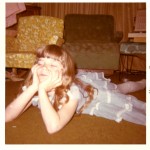 When my sisters and I were kids, our parents had a movie camera, a projector, and a movie screen. They took a lot of home movies. It was as common then as it is now, but the technology has changed dramatically. Still, I don’t think that the home movies we have today are enjoyed in quite the same way as they were back then. When you have to set up a projector and screen, and then put them away afterward, watching home movies is a big production, and one that doesn’t happen often. It becomes a special occasion that kids will fight to stay awake for. These days, it is often one person watching on a computer screen or a television, and there just isn’t the same crowd to laugh at all the funny things.
When my sisters and I were kids, our parents had a movie camera, a projector, and a movie screen. They took a lot of home movies. It was as common then as it is now, but the technology has changed dramatically. Still, I don’t think that the home movies we have today are enjoyed in quite the same way as they were back then. When you have to set up a projector and screen, and then put them away afterward, watching home movies is a big production, and one that doesn’t happen often. It becomes a special occasion that kids will fight to stay awake for. These days, it is often one person watching on a computer screen or a television, and there just isn’t the same crowd to laugh at all the funny things.
That was exactly how it was in our family. When we talked Mom and Dad into watching home movies, we wanted to stay up and watch as many as we could in one night. Asking to watch “just one more” was not unheard of. For our youngest sister, Allyn Hadlock, staying up was a little more difficult than for the rest of us. Nevertheless, on one night in particular, she insisted that she could stay awake for the movie. Mom and Dad put the movie on the projector, and we started watching it. It wasn’t long before Allyn began to doze off. Dad tried to keep her awake, but it was no use. She was just too tired. Before long, Allyn was sound asleep. The movie was just too long. Of course, we all knew that Allyn was sleeping, and in a way it was funny, because she didn’t lay her head down or anything, but rather looked like she was watching the movie.
I’m not sure how much of the movie Allyn missed, but even when it was over, she did not wake up. We turned  on the lights, but she didn’t move. Finally, it was time to wake her up, and when we did, she was quite startled. Someone was right there with the camera to record the humorous moment, and I must say that I’m glad they were. Kids do such silly stuff sometimes, and so often we forget to record the silliness. Later on, all we have is the story of the funny event, but nothing to really show how it happened, but in this case, we had the ammunition to tease Allyn for years to come. It is almost all the ammunition we have on her, becaue she never got into trouble..just ask us, we’ll tell you. Sometimes it is the goofy things we do as kids that are the most embarrassing. So, here’s to embarrassing moments. It is impossible to go through life without them, and Allyn just think, at least you didn’t fall asleep in school…that we know of.
on the lights, but she didn’t move. Finally, it was time to wake her up, and when we did, she was quite startled. Someone was right there with the camera to record the humorous moment, and I must say that I’m glad they were. Kids do such silly stuff sometimes, and so often we forget to record the silliness. Later on, all we have is the story of the funny event, but nothing to really show how it happened, but in this case, we had the ammunition to tease Allyn for years to come. It is almost all the ammunition we have on her, becaue she never got into trouble..just ask us, we’ll tell you. Sometimes it is the goofy things we do as kids that are the most embarrassing. So, here’s to embarrassing moments. It is impossible to go through life without them, and Allyn just think, at least you didn’t fall asleep in school…that we know of.
 People joke about being tired after they retire, or at least that is what the hats all say, but I don’t really think that is the case most of the time. After all, let’s face it, when you are retired, you can sleep in as long as you choose, and if that still isn’t enough, well, just take a nap in the afternoon. I think that most retired people get up early, because of that afternoon nap. Seriously, there are only so many hours that a person can sleep. I don’t know if my brother-in-law, Lynn Cook is one of those early risers, who nap in the afternoon, but it wouldn’t surprise me at all.
People joke about being tired after they retire, or at least that is what the hats all say, but I don’t really think that is the case most of the time. After all, let’s face it, when you are retired, you can sleep in as long as you choose, and if that still isn’t enough, well, just take a nap in the afternoon. I think that most retired people get up early, because of that afternoon nap. Seriously, there are only so many hours that a person can sleep. I don’t know if my brother-in-law, Lynn Cook is one of those early risers, who nap in the afternoon, but it wouldn’t surprise me at all.
Many retired people head south for the winter, or travel all over the country during the rest of the year, but for Lynn, and my sister-in-law, Debbie, the big draw that retirement held, was camping in the Big Horn Mountains. Their idea of a relaxing time is being in the quiet of the mountains, preferably with just the birds and other wildlife as neighbors, unless their kids come up to join 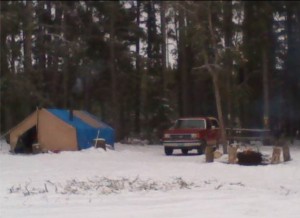 them, that is. During the summer months, they will stay in the mountains for weeks at a time, unless some specific thing requires them to come back to town, and back to reality. I think lots of people would call that a little slice of Heaven on Earth. I would have to agree that being in the mountains is most likely right where I would want to be too, but Bob and I would most likely not want to camp out, however. We like to hike, and then we want the comfort of a motel room…at this point anyway.
them, that is. During the summer months, they will stay in the mountains for weeks at a time, unless some specific thing requires them to come back to town, and back to reality. I think lots of people would call that a little slice of Heaven on Earth. I would have to agree that being in the mountains is most likely right where I would want to be too, but Bob and I would most likely not want to camp out, however. We like to hike, and then we want the comfort of a motel room…at this point anyway.
Since Lynn used to drive truck for a living, and was always on the road, long term travel doesn’t really appeal to him much, but the short drive to the Big Horns is something he really likes. He is getting a little better about other travel on occasion now too, but as far as I know a long trip means driving from Powell, Wyoming to  Casper, Wyoming…not exactly what most of us would consider a long trip, but it’s a pretty big step for him.
Casper, Wyoming…not exactly what most of us would consider a long trip, but it’s a pretty big step for him.
Since his retirement, Lynn has become more and more of a mountain man than ever before. I think there was always a bit of Jeremiah Johnson in him, but since he would live on the mountain in a tent these days, he seems more and more so. Even then, I can’t exactly blame him. I would love to have a cozy cabin in the mountains where I could hole up sometimes…especially when the responsibilities of life get a little too overwhelming. Today is Lynn’s birthday. Happy birthday Lynn!! Have a great day!! We love you!!
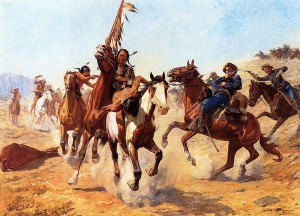 I don’t always think of myself as living in a historic area, although I should, because during the days of the Old West, at least, much history happened here. In fact, on this day, July 28, 1865, twenty year old Caspar Collins…a gutsy lieutenant from Dogwood Knob and Hillsboro, Ohio led 20 men to fight a battle against 1,000 to 3,000 Indians, just outside Platte Bridge Station, which was near Casper, Wyoming, where I live. The battle had been coming, and everyone knew it. The Lakota Sioux and the Cheyenne Indians had been attacking the United States Army for a couple of months now. The Indians had raided outposts and stagecoach stations over a wide area of Wyoming. On this day back in 1865, the Indians assembled their warriors and descended on Platte Bridge Station. The Platte River bridge was guarded by 120 men near the bridge, and another 28 soldiers guarded a wagon train a few miles away. The Indians killed 29 soldiers, while only losing 8 warriors in the raid.
I don’t always think of myself as living in a historic area, although I should, because during the days of the Old West, at least, much history happened here. In fact, on this day, July 28, 1865, twenty year old Caspar Collins…a gutsy lieutenant from Dogwood Knob and Hillsboro, Ohio led 20 men to fight a battle against 1,000 to 3,000 Indians, just outside Platte Bridge Station, which was near Casper, Wyoming, where I live. The battle had been coming, and everyone knew it. The Lakota Sioux and the Cheyenne Indians had been attacking the United States Army for a couple of months now. The Indians had raided outposts and stagecoach stations over a wide area of Wyoming. On this day back in 1865, the Indians assembled their warriors and descended on Platte Bridge Station. The Platte River bridge was guarded by 120 men near the bridge, and another 28 soldiers guarded a wagon train a few miles away. The Indians killed 29 soldiers, while only losing 8 warriors in the raid.
In reality, the Army was unprepared for this attack or the ones leading up to it. Colonel Thomas Moonlight had led a 500 Cavalry force out to seek out and punish the raiding Indians on May 26, 1865. He hung to minor Oglala leaders…Two Face and Black Foot. He left them hanging for days. I’m sure this infuriated the Indians. On June 3, the army began to worry that the 1,500 Lakota, mostly Brulé, and Arapaho who were living near Fort Laramie, might become hostile. So they decided to move them about 300 miles east to Fort Kearny in Nebraska. The Indians protested that Fort Kearny was in the territory of their traditional enemies, the Pawnee. The next day, near present day Morrill, Nebraska, most of the Indians refused to accompany the soldiers and 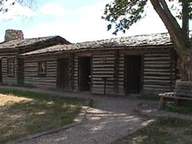 began crossing the North Platte River, assisted by Crazy Horse and a band of Oglalas on the other side. Attempting to stop them, Captain William D. Fouts and four soldiers were killed. Informed of the disaster, Moonlight departed Fort Laramie with 234 cavalry to pursue the Indians. He traveled so fast that many of his men had to turn back because their horses were spent. On June 17, near present day Harrison, Nebraska, the Lakota raided his horse herd and relieved him of most of his remaining horses. Moonlight and his men had to walk 60 miles back to Fort Laramie. He was severely criticized by his soldiers for being drunk and not setting a guard on his horses. On July 7, Moonlight was relieved of his command and mustered out of the army.
began crossing the North Platte River, assisted by Crazy Horse and a band of Oglalas on the other side. Attempting to stop them, Captain William D. Fouts and four soldiers were killed. Informed of the disaster, Moonlight departed Fort Laramie with 234 cavalry to pursue the Indians. He traveled so fast that many of his men had to turn back because their horses were spent. On June 17, near present day Harrison, Nebraska, the Lakota raided his horse herd and relieved him of most of his remaining horses. Moonlight and his men had to walk 60 miles back to Fort Laramie. He was severely criticized by his soldiers for being drunk and not setting a guard on his horses. On July 7, Moonlight was relieved of his command and mustered out of the army.
The Platte River bridge was a key crossing point of the North Platte River for wagon trains of emigrants traveling the Oregon and Bozeman Trails. The Indians wanted to stop traffic on the Bozeman Trail which led through the heart of their hunting territory. The bridge had been constructed in 1859 and was almost 1,000 feet long and 17 feet wide. On July 20, Indian leaders made their final decision to launch an attack against the bridge. The warriors gathered and set out southward from the mouth of Crazy Woman Creek on the Powder River. The Platte River Bridge was 115 miles south. The army was the largest they had ever seen. It was estimated to number 3,000 men. U.S. army accounts state that the wagons were forced into a hollow where they held out for four hours, using fire from Spencer rifles to repel assaults until a large group closed on foot and overwhelmed the defenders, killing all.
Then came the attack of Platte Bridge Station. The battle that left 29 men dead…including Lieutenant Caspar 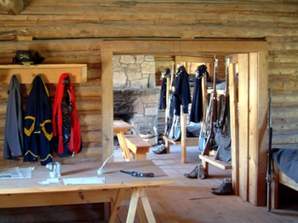 Collins, and at least 10 more men seriously injured. The battles before had involved maybe 1000 Indians. This battle was different…this one involved 3000. They were seriously outnumbered, but Lieutenant Caspar Collins went out to fight anyway. The day after the battle, the Indian army broke up into small groups and dispersed. A few remained near the Oregon Trail for raiding but most returned to their villages in the Powder River country for their summer buffalo hunt. Indians lacked the resources to keep an army in the field for an extended period of time. The Army officially renamed Platte Bridge Station to Fort Caspar to honor Collins, using his given name to differentiate the post from an existing fort in Colorado named after Collins’ father.
Collins, and at least 10 more men seriously injured. The battles before had involved maybe 1000 Indians. This battle was different…this one involved 3000. They were seriously outnumbered, but Lieutenant Caspar Collins went out to fight anyway. The day after the battle, the Indian army broke up into small groups and dispersed. A few remained near the Oregon Trail for raiding but most returned to their villages in the Powder River country for their summer buffalo hunt. Indians lacked the resources to keep an army in the field for an extended period of time. The Army officially renamed Platte Bridge Station to Fort Caspar to honor Collins, using his given name to differentiate the post from an existing fort in Colorado named after Collins’ father.

